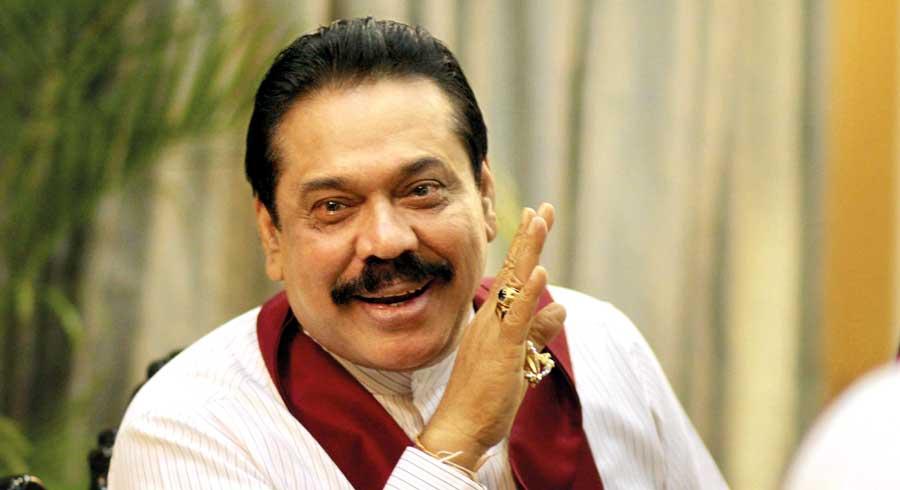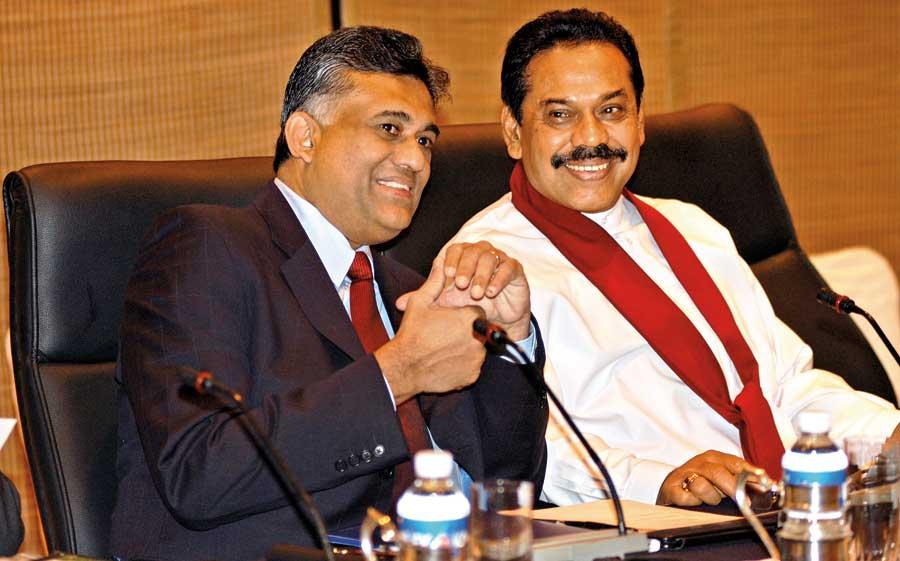01 Jul 2020 - {{hitsCtrl.values.hits}}

As we commemorate 50 years in Politics of Prime Minister Mahinda Rajapaksa (here forth referred to as Mahinda), 
I thought it befitting to pen an article about him; an insight into his long journey and numerous milestones, some of which, I have had the unique privilege of being associated with for over a span of four decades.
Here the nature of this article remains entirely from the author’s perception in the absence of any dialogue with the Prime Minister. This must not be mistaken as a political biography, but Mahinda Rajapaksa’s life being part of the unfolding history, intricately woven with the past and future of Sri Lanka. It therefore becomes inevitable that politics forms a backdrop to his public and often private actions. This article explores his life, through access to the many personalities and facets that lie within him and if possible, to unravel and reveal an insight into the intuition by which many of his actions are guided.
"Mahinda thought it best to allow the status-quo to remain until such a time that the country’s defence establishment was reinforced and strengthened adequately"
I first met Mahinda in January 1974 on the corridors of the Law College when he entered in the 74th Batch of the Law College. I was a year senior to him. By then he was already serving as a Member of Parliament and more often than not my wife Deepthi and I would visit him at the old Parliament where he would showcase his gracious hospitality by hosting us to a scrumptious meal. This Mahinda subsequently becoming a lawyer, whilst being defeated in two consecutive Parliamentary Elections, remained engaged with the people, becoming a true people’s representative in the annals of Sri Lanka’s politics. His achievements need no elaboration but highlighting his re-entry to Parliament in 1989 and his continuous evolution to becoming the President of Sri Lanka in 2005, MR’s political journey traversed many key milestones.
MR held vital portfolios from an array of Cabinet Ministries, The Leader of the Opposition, to holding Office as the President of Sri Lanka for two terms and becoming the Prime Minister not just a mere twice but three times over.
The main hallmark of Mahinda’s vibrant character in all these spheres was grounded by his humility and his warm nature. Within him though, he possess’ a sharp intellect that is keenly attuned to the Voice of the People of this great nation. His understanding of intricate issues is coloured by his understanding of the entirety of any situation. These strengths along with his singular focus were on broad display when his direction and astute leadership led to the eventual defeat of Terrorism in 2009 and restoration of normalcy and economic prosperity to the People of this great nation by 2015
I may cite a few instances where his foresight prevented catastrophic consequences during my tenure as Foreign Minister. While Sri Lanka was heavily involved in the military confrontation with the LTTE, we were experiencing many obstacles with extreme pressures put forth by the International Community. These obstacles ranged from Ceasefire Agreements, unreasonable obstruction in procurement of military hardware and extending to the sourcing of financial assistance to keep the economy running. Through this extenuating period, Mahinda’s singular objective remained the deliverance of the country from the grip of extremism and separatism, which had consumed more than half of Sri Lanka’s Post-Independence Era. He understood the principle that the rights of minorities were of utmost importance for Democracy to prevail.
"This article explores his life, through access to the many personalities and facets that lie within him and if possible, to unravel and reveal an insight into the intuition by which many of his actions are guided"
His outreach to the world displayed his true characteristics as a statesman who did not mince National pride and priorities for mere accommodation of hidden agendas. The 2002 Ceasefire Agreement negotiated between the UNF Government and the LTTE, remained a stringent obstacle in the immediate prosecution of the war against the LTTE. I too had the occasion to negotiate in Geneva, at the Peace Talks in 2006 on two occasions. Mahinda thought it best to allow the status-quo to remain until such a time that the country’s defence establishment was reinforced and strengthened adequately, a task handled meticulously by then Defence Secretary Gotabaya Rajapaksa.
These facets of MR’s inner workings were visibly apparent during our frequent travels to world capitals. He demonstrated his steadfast commitment without even an iota of shifting, in meetings with World Leaders. His candid submissions which sometimes may not have been to the liking of many Leaders, was respectfully appreciated as his sincerity to the cause. This was entirely due to his candour without emotional prejudices regarding the source of such negative developments. I witnessed his continuous friendship with key world players ensuring the greater allegiance and necessary strategic alliances for Sri Lanka’s interest. During my period as Foreign Minister, Mahinda encouraged Sri Lanka to be entered across many world platforms including the recent forums such as the Shangri-La Dialogue, Asian Cooperation Dialogue, Asian Regional Corporation (2007 onwards) and Shanghai Cooperation (2008 onwards). These were in addition to Sri Lanka hosting, under Mahinda’s leadership the SAARC summit in 2008 and The Commonwealth Heads of State Summit in 2013. The prominent participation of Sri Lanka at The Non-Aligned Summit along with regular attendance at the UN Annual General Assembly in New York is witnessed under MR’s leadership. This showcased the strengths of Mahinda as a true statesman and a seasoned diplomat while never exhibiting a pendulum shift from his pleasant personality and warmth. What he carried most evidently in him was the deep understanding of the individuals with whom he is dealing and their domestic compulsions. He respected India’s hegemony over South Asia whilst recognising China as an emerging power that would employ asymmetric methods to thwart America’s traditional advantages in the air and at sea.
"Within him though, he possess’ a sharp intellect that is keenly attuned to the Voice of the People of this great nation"
The dimensions of foreign relations coupled with economic benefits to the Country was considered to be entwined together, to bring about post-conflict development in the landscape of Sri Lanka. The FDI that entered Sri Lanka, starting in 2006, a year into his governance, registered the first milestone of USD 640M FDI; thus setting a new record and leading subsequently to many positive developments in the Country, which include the Port City Colombo project, of which the glimpses of a better future are now becoming visible. The change of Colombo’s skyline with direct private investments is a major demonstration in the confidence that was placed on the Mahinda Rajapaksa’s Government. I perceive the reason for this to be his outreach to the corporate world without any political divide or bias.
Mahinda had the conviction and sincere belief that the war could be won and therefore, he simultaneously deployed the economic tools and strategies at his disposal to advance the Country’s development. A great initiative in this regard was the acceleration of the Highway Network throughout Sri Lanka. MR’s vision was similar to that of the ‘Golden Quadrilateral Roadways Project’ of Indian Prime Minister Atal Bihari Vajpayee. Similarly, in the years to come, the network of Sri Lanka’s expressways will catalyse unprecedented Economic and Social benefits to the populous of the country. These are just some of the aspects of Mahinda’s lasting and continued service to Sri Lanka.
50 Years is long time in one’s life. To remain in politics for such a long period and still continuing to do with such momentum is no easy task. I have to complement and congratulate Mahinda on retaining the public’s confidence and their respect over the years. Asia now sees PM Mahinda Rajapaksa as the eminent senior statesmen in the Asian Region.
His achievements in winning the war and bringing forth peace, coupled with economic prosperity, will not only remain in the hearts of the people but will serve as founding pillars in Sri Lanka’s Future in the 21st century and beyond.

The writer Rohitha Bogallagama (left) pictured with Premier Mahinda Rajapaksa
02 Jan 2025 41 minute ago
02 Jan 2025 2 hours ago
02 Jan 2025 3 hours ago
02 Jan 2025 4 hours ago
02 Jan 2025 4 hours ago